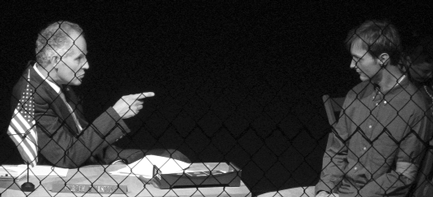Edward Miller’s dystopian drama suggests that hope springs eternal
Edward Miller’s new drama “Revolution Row,” has a dystopian setting ten years in the future, in a time when conservative Republicans have made abortion illegal, reinstated prayer in the schools, and declared homosexuality more or less illegal. Rebels have decided to stand up against these injustices, but find themselves locked up in a federal prison. The sometimes heavy-handed plot aims to serve as a cautionary tale, but could just as easily be a look at our society half a century ago—or, more chillingly, today.
The play opens with a group of prisoners standing in the yard, with a view of a lanky, bureaucratic warden named Brickstone, played by Jack Drucker, on the phone with the president, cautioning him that the prisons are at triple capacity. Gays and their allies have gotten arrested in a show of civil disobedience, led by the educated, cool-headed Reggie Mason, Chris Gilmer in an inspired performance.
“Who would have thought one individual could cause so much trouble?” asks the Warden, as though the role of charismatic leaders throughout history had eluded him. Reggie’s “plans to bring down the country” as the warden terms his activism, have landed him in the punk tank, also known as revolution row. There he is joined by Latino boy-toy Diego, (Charles Gould borrowing heavily from Johnny Depp in “Before Night Falls”), fey Peter (Craig Jessup), blond, butch Marcus (Benjamin Roth, one of the best players of the bunch), farm boy Thaddeus (Steven Bussen), and several others.
The play moves from the prison yard to the mess hall to the warden’s office and back, and the narrative exposition suggests a group remarkably articulate about the specific of their civil liberties demands. Miller is painstaking in laying out the conventional left and right answers on many issues, including internecine disputes between mainstream gays and radicals, but the language is stilted and unnatural, as though the characters are reading from a list of talking points. Miller would serve his story better if he made his dialogue less lofty, but to his credit, the script is paced well and focuses on important concerns.
An interview on TV with a sympathetic journalist lands Reggie in maximum security, and his role is taken up by Terrence, an African-American former music star atheist jailed for protesting the merging of church and state. Terrence (the playwright Miller) is willing to take on other black civil rights leaders unwilling to embrace gay rights. Oh, did I mention? He also sings.
Warden Brickstone insists, “Reginald Mason is hardly a Nelson Mandela… he’s just a petulant little punk,” but in fact Reggie’s example inspires public protest that eventually leads to the release of some of the dissidents. Having been sodomized by a guard’s nightstick, Peter, sullen and cast throughout as timid, nonetheless has the moxie to shank the guy on the way out jail.
The set, a fenced-in cage with jerry-rigged barbed wire and simple sawhorse tables and wooden chairs, is clever and functional, and big kudos go out to the lighting and sound techs, who managed to intersperse scenes with a fantastic mix of revolutionary rock from Le Tigre to Patti Smith.
“Revolution Row” has its merits, though the idea of outlawing abortion and homosexuality may seem beyond the pale even at this momement of heightened cultural warfare. Miller is willing to imagine the worst, but also to show faith in the resiliency of decency and freedom-loving.
gaycitynews.com



































